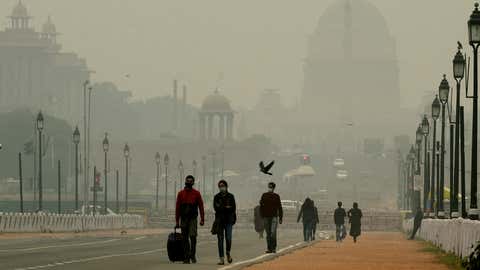Air pollution in South Asia presents a complex challenge intertwined with political dynamics, posing cross-border issues that demand coordinated efforts for effective solutions.
Regional Impact:
South Asia grapples with severe air pollution, largely attributed to industrial emissions, vehicular exhaust, and agricultural practices. The consequences of this pollution extend beyond national borders, affecting neighboring countries. The transboundary nature of air pollution demands regional cooperation for comprehensive mitigation strategies.

SOURCE:- INDIA TODAY
Political Implications:
Political factors exacerbate the issue as countries in South Asia navigate differing priorities, economic considerations, and diplomatic relations. Striking a balance between economic growth and environmental conservation often becomes a contentious point, leading to challenges in adopting stringent pollution control measures.
SOURCE:- HINDUSTAN TIMES
Cross-Border Collaboration:
Addressing air pollution necessitates collaborative efforts among South Asian nations. Shared airsheds mean that pollution generated in one country can significantly impact the air quality of neighboring states. Establishing regional agreements and frameworks for joint monitoring, data sharing, and coordinated policies becomes imperative.
Diplomatic Challenges:
Political relations between South Asian countries can influence collaborative endeavors. Historical tensions and geopolitical considerations may hinder the establishment of effective mechanisms to combat air pollution. Diplomatic efforts are required to transcend political differences and prioritize the collective well-being of the region’s populations.
Public Health Concerns:
The health implications of air pollution are severe, contributing to respiratory diseases, cardiovascular issues, and overall reduced life expectancy. As citizens become increasingly aware of these health risks, there is growing pressure on governments to address the root causes of pollution, necessitating political will and commitment.
Economic Impact:
Air pollution also carries economic ramifications, affecting sectors such as healthcare and agriculture. Increased healthcare costs and decreased agricultural productivity due to pollution impact economies across borders. Recognizing these shared economic vulnerabilities can serve as a catalyst for regional cooperation.
International Support:
Global actors and environmental organizations can play a crucial role in fostering cooperation. Facilitating dialogues, providing technological assistance, and offering financial support for sustainable practices can incentivize South Asian countries to collaborate on tackling the shared challenge of air pollution.
the intricate interplay between air pollution and politics in South Asia demands a multi-faceted approach. Regional collaboration, diplomatic initiatives, and international support are essential elements in navigating the complexities of cross-border challenges. The synergy between environmental stewardship and political cooperation is crucial for ensuring a sustainable and healthier future for the entire South Asian region.
Share your views in the comments

